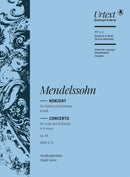| 作曲者 | Felix Mendelssohn (1809-1847)・フェリークス・メンデルスゾーン |
| タイトル | Violinkonzert = Violin Concerto in E minor Op. 64 MWV O 14 (ポケット・スコア) |
| サブタイトル | Urtext based on the Leipzig Mendelssohn Complete Edition |
| 出版社 | Breitkopf & Härtel・ブライトコプフ |
| 楽器編成 | Violin,ヴァイオリン |
| 楽器編成(詳細) | solo: vl – 2.2.2.2 – 2.2.0.0 – timp – str |
| 品番 | 979-0004216491 |
| 校訂者 | Birgit Müller |
| 形状 | 112 ページ・16.5 x 22.5 cm・230 g・ソフトカバー |
| 演奏時間 | 25分 |
| 出版年 | 2023年 |
| 出版番号 | PB 5712 |
| ISMN | 979-0004216491 |
| サンプル | https://www.breitkopf.com/assets/haendler/samples/9790004216491.pdf |
Felix Mendelssohn created a standard work with his final violin concerto in E minor op. 64 MWV O 14 that is now firmly established in today’s concert repertoire. When in 1838 the composer indicated that he had “in mind a violin concerto […] in E minor […],” it was not only his friend Ferdinand David, the Gewandhaus concertmaster for whom it was intended, who was euphoric. The “whole civilized violin world” was awaiting this concerto – and yet it was another seven years before the much-anticipated composition was ultimately published by the Leipzig publishing house Breitkopf & Härtel in June 1845, as well as simultaneously in London and Milan. The concerto particularly appeals through its innovative treatment of the solo part, not only because the solo violin strikingly opens the first movement without a preceding orchestral tutti, but also because of its musical dialogue with the orchestra. The Leipzig Gewandhaus premiere on 13 March 1845 with Ferdinand David as soloist under the direction of Nils Wilhelm Gade served – as so frequently with Mendelssohn – virtually as a proofreading process. After the composer subsequently made extensive changes that also involved David, the work first appeared just short of nine months later. The first edition documents the composer’s valid final revision, which is reproduced as the work’s main version in the present Urtext edition.The matching piano reduction includes not only an unmarked string part, but also a part with the established markings by Igor Oistrach.



